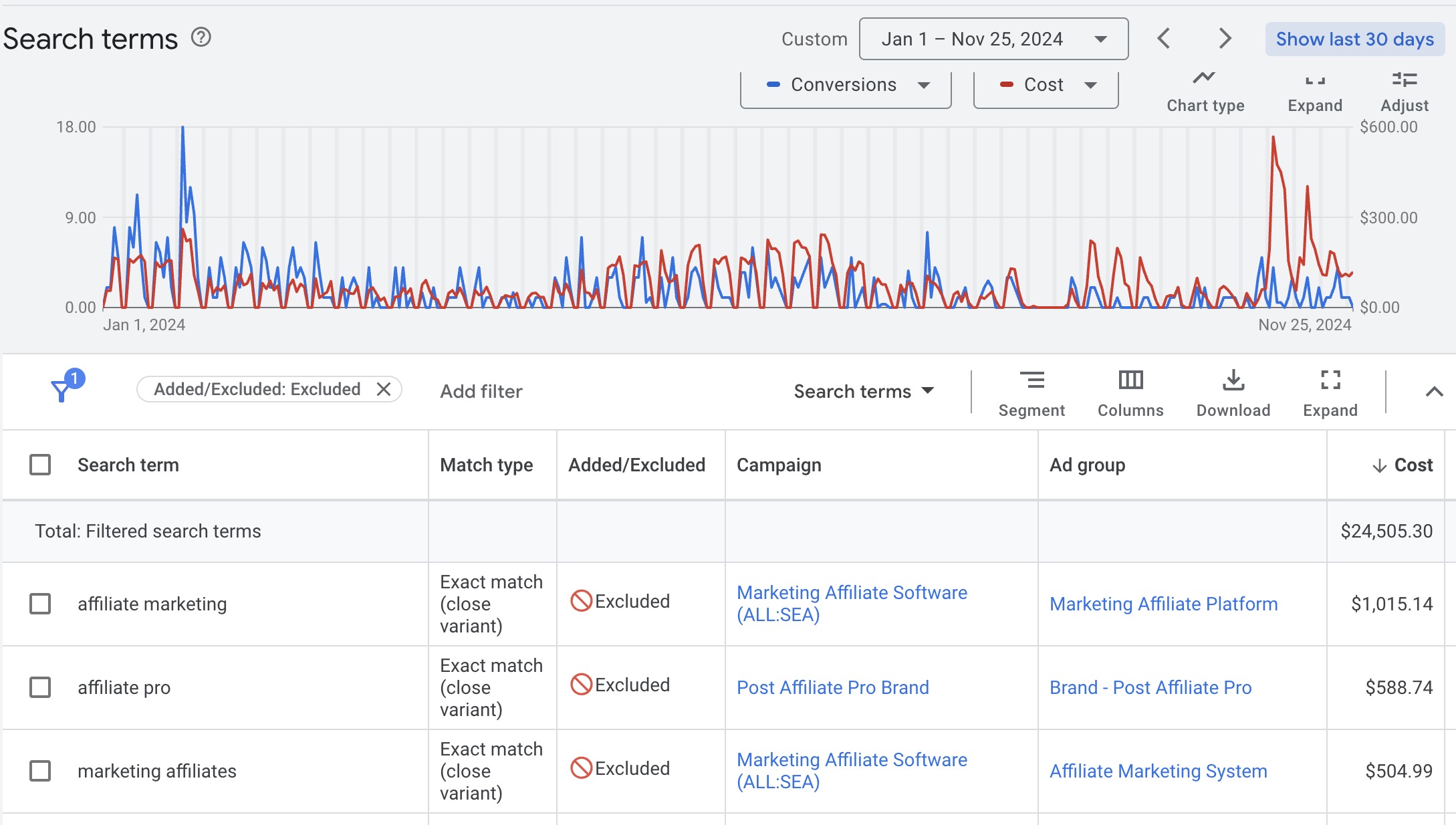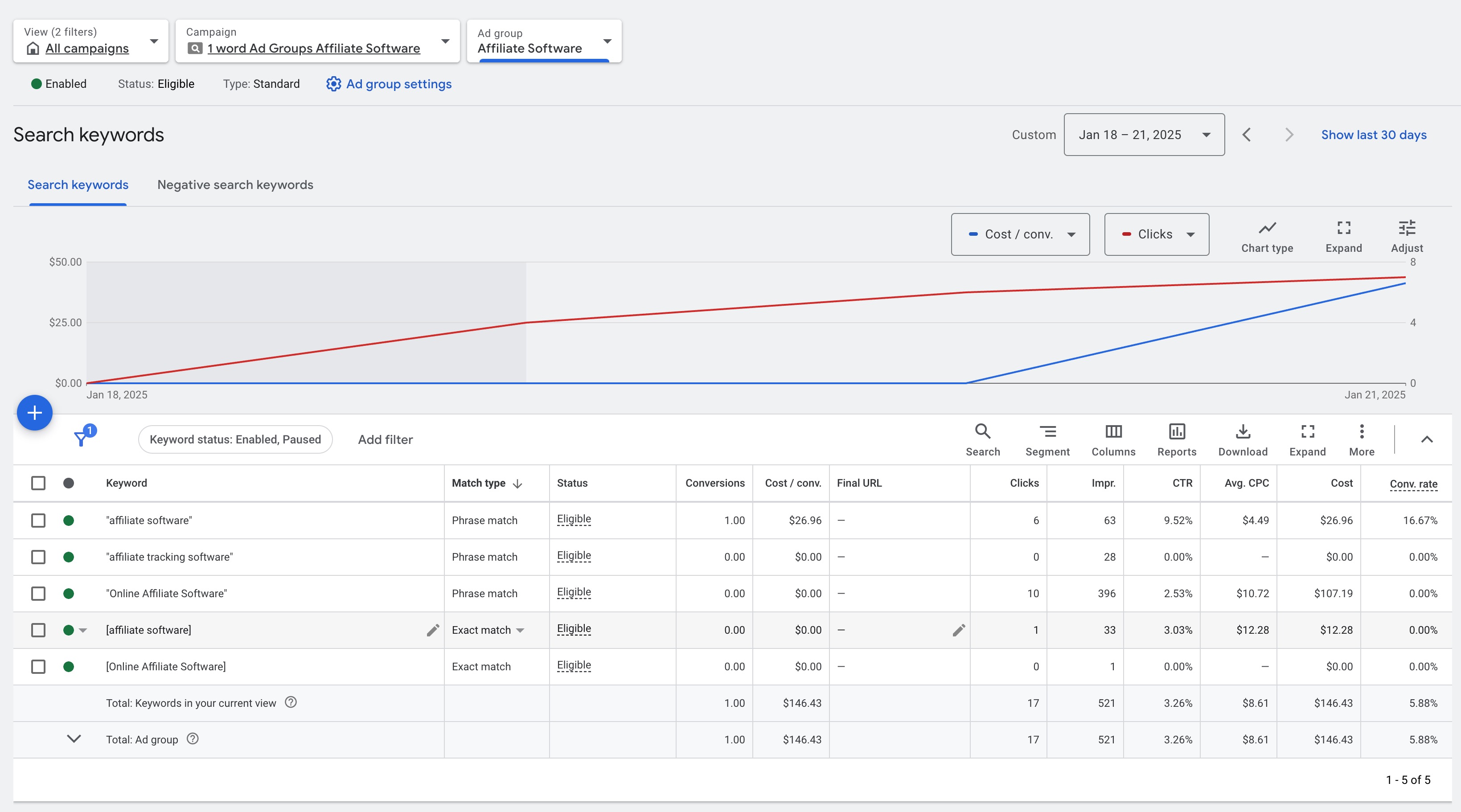
Understanding PPC Optimization and Keyword Grouping
Learn how to optimize PPC campaigns and master keyword grouping for higher relevance, improved Quality Scores, better ROI, and effective campaign management. Di...
Boost conversions and lower costs with FlowHunt’s PPC management automation. Optimize keywords, leverage negative keywords, and achieve efficient, high-performing campaigns.
For many businesses, especially in the B2B sector, achieving a high conversion rate from pay-per-click (PPC) campaigns is a constant struggle. The root cause often lies in poor keyword management. Solving the Exact match dilemma is still a key. Exact match keywords, once a reliable tool, have shifted in functionality and now operate more like keyword variations. This shift leads to unintended traffic, wasted ad spend, and lower conversions.
Here’s a real-world example:
A campaign using 58,000 search terms, narrowed to 1,177 keywords, faced a spiral of inefficiency due to broad match type overlaps. This uncontrolled spiral often results in skyrocketing costs and poor results, particularly for large accounts. For e-shops and B2B campaigns, the margin between useful and irrelevant traffic is razor-thin, making precision absolutely critical.
Which PPC Management Automation Strategy Works Best?
Initially, we started with a strategy focused on maximizing clicks. This approach emphasized farming search terms and keywords, leading to high volumes of data but little actionable insight. As we analyzed the search terms and keywords more closely, it became clear that this method was inefficient and unsustainable. Recognizing this, we adopted a new strategy centered around clustering keywords, leveraging negative keywords, and prioritizing precision over volume. This shift resulted in improved targeting and a dramatic boost in conversion rates.
Working with Negative Keywords
Negative keywords are crucial to filtering out irrelevant traffic. By identifying variations of keywords that don’t convert, businesses can prevent wasted clicks and better target their ideal audience.
Clustering Keywords
Grouping similar keywords into clusters allows for better management and clearer insights. This clustering approach helps pinpoint which terms drive conversions and which lead to irrelevant traffic.
Eliminating Keyword Variations
Variations that don’t align with your campaign’s goals should be systematically excluded through negative keyword lists.
This screenshot above showcases our software’s advanced keyword clustering feature, illustrating the relationships between search terms and keywords. The interconnected nodes highlight areas where keywords are suboptimal, with overlapping or redundant terms that require filtering and adjustment. This visualization helps pinpoint inefficiencies in keyword management, enabling better targeting and more effective PPC campaign optimization.
Google’s algorithm thrives on data and budget volume, which puts smaller B2B campaigns at a disadvantage. Without these measures, campaigns can spiral into inefficiency, resulting in low conversion rates and high costs.
Our software is designed to solve these challenges by:
By using our software, you can double your conversion rates and gain control over your PPC campaigns, even with a limited budget and data set.
We tested our software on our own campaigns and saw massive improvements. By reducing search terms, managing exact matches, and leveraging negative keywords, we achieved:
Here’s a direct output from our CRM system, showcasing the PPC offline conversion tracking for our B2B market Google Ads campaigns. On October 27th of this year, we implemented our new software, and the impact is already evident.
You can see our Google Ad spend per month has significantly decreased, ad trials are more targeted and substantially lower, while upgrades remain at a normal pace. Most impressively, the cost per upgrade has dropped, and the conversion rate from trials to paid users has more than doubled! This incredible improvement highlights the efficiency and effectiveness of our new approach.
Stop letting inefficient keyword management drain your ad budget. Take control of your campaigns and start maximizing conversions with our software. Schedule a demo today and see the difference for yourself.
PPC management automation uses software to optimize and manage pay-per-click campaigns, streamlining processes like keyword clustering, negative keyword identification, and conversion tracking for better performance and reduced ad spend.
By clustering keywords, leveraging negative keywords, and eliminating irrelevant variations, campaigns target the right audience, reduce wasted clicks, and increase the likelihood of conversions.
Users have reported a significant drop in wasted ad spend and a doubling of conversion rates by automating keyword management and utilizing data-driven campaign insights.
Businesses running B2B or e-commerce PPC campaigns, especially those struggling with high costs and low conversion rates due to inefficient keyword targeting, will benefit most from automation tools like FlowHunt.
Take control of your campaigns and start maximizing conversions. Schedule a demo and see how our automation software can double your conversion rates.
Learn how to optimize PPC campaigns and master keyword grouping for higher relevance, improved Quality Scores, better ROI, and effective campaign management. Di...
Learn how FlowHunt's AI-driven automation optimizes Google Ads campaigns by managing negative keywords, reducing wasted spend, and boosting ROI with real-time k...
Automate negative keywords in Google Ads with FlowHunt's PPC AI Agent. Exclude irrelevant queries, reduce wasted spend, and improve conversions with AI-driven t...



